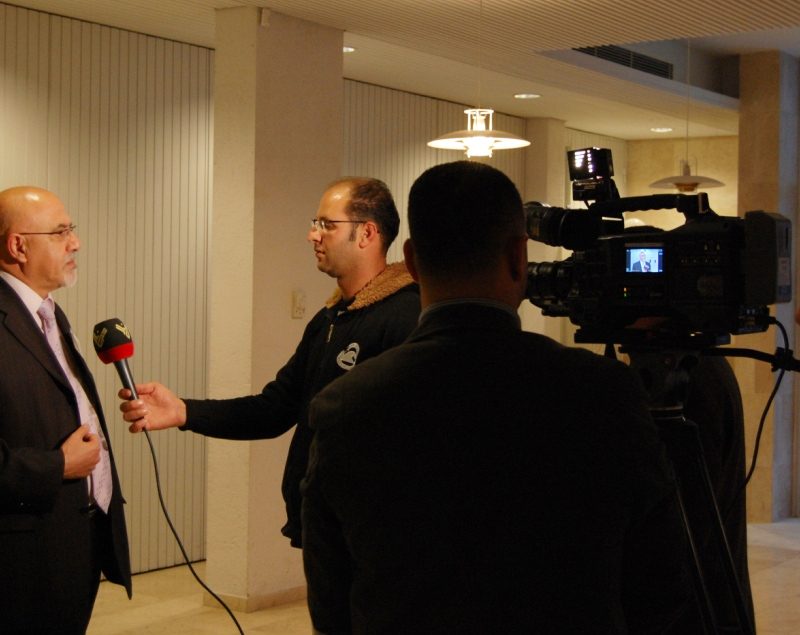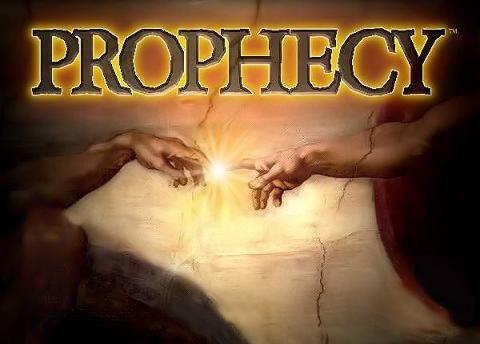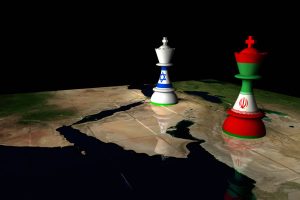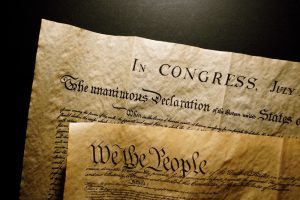
- At the heart of its call for peace and justice, however, lies a profound imbalance. We might say that Ionians, like Quakers and many other Christian groups, are naïve innocents let loose in the real world. There is a role for idealists in limited situations. But problems arise when such do-gooders do not properly understand what lies behind mutual hatred, enduring antagonism between people, and conflicts in the name of one cause or another. And here, the Iona Community falls down spectacularly.
- Kairos is built on an Islamic, not a Christian narrative. Under Islamic law, territory once conquered by Muslim armies becomes sacrosanct and can never be forfeited to non-believers. If non-Muslims take control of formerly Muslim land (for example, Spain or Portugal), then Muslims are bound to reconquer it through renewed military action.
- Kairos, significantly, does not refer to the fact that Jews lived in and ruled in the region long before the Arab conquests.
- When Christians choose to ignore the rights of Jews, they deny their own origins in the land. Jesus was a Jew. The first Christian community was made up of Jews who adhered to Jewish law. All Christian churches recognize the Jewish Bible as part of their own scriptural, and the New Testament is a clear record of Jewish existence in the first Christian century.
- There never was a “historic Palestine”, and it is disturbing to find a Christian community buying into the modern Islamic narrative. and the “Palestinian” inhabitants of the Mandate are a combination of the descendants of the 7th-century Arab invaders.
- In Israel, Jewish, Arab, Christian, Druze and other citizens, regardless of race or religion or any other circumstance, have exactly the same rights under law to form political parties, serve in parliament, seek employment. Why does the Iona Community single Israel out?
- Why is the Iona Community seemingly uninterested in the fate of their fellow Christians in the Palestinian territories yet determined to accuse Israel of enormities, when in fact, Israel is the only country in the Middle East where the Christian population, instead of diminishing, has grown since the establishment of the state?
- Why, then, does the Iona Community join forces, not with the people who support Christians but with Palestinian Muslims who seek to destroy Israel and who will, in due course, treat the Christians as badly as they are treated in other Arab Muslim states?
- The Israelis have never stalled in the peace process: they have made offers and the Palestinians have turned them all down. There has never been peace because Israel has no partners for peace. That a so-called Christian organization should misrepresent history in this way is an appalling dereliction of truth and honesty on its part.
- When will the Iona Community come to terms with its far-left bias, its anti-Semitism, its own reputation, and the harm it is doing to any real hope in the Holy Land for peace?
The Iona Community is a famous ecumenical Christian community with three centers in Scotland, two on the island of Iona in the beautiful Inner Hebrides off the west coast of Scotland and another on the nearby Isle of Mull. But the community is also a far-flung body, with members across the globe. These include people from many denominations, from Presbyterians and Anglicans to Lutherans, Roman Catholics and Quakers, not forgetting members who do not belong to any church.
Apart from ecumenism and a broad dedication to prayer, meditation, and commitment to its own liturgical practices and Rule, the Community holds it to be central to its ethos that members pursue issues relating to peace and justice. Among other things, its Rule holds:
that the Gospel commands us to seek peace founded on justice and that costly reconciliation is at the heart of the Gospel;
that work for justice, peace and an equitable society is a matter of extreme urgency;
that social and political action leading to justice for all people and encouraged by prayer and discussion is a vital work of the Church at all levels
Members are enjoined, among other activities, to
engage in forms of political witness and action, prayerfully and thoughtfully, to promote just and peaceful social, political and economic structures;
celebrate human diversity and actively work to combat discrimination on grounds of age, colour, disability, mental wellbeing, differing ability, gender, race, ethnic and cultural background, sexual orientation or religion;
work for the establishment of the United Nations Organisation as the principal organ of international reconciliation and security, in place of military alliances;
support and promote research and education into nonviolent ways of achieving justice, peace and a sustainable global society;
work for reconciliation within and among nations by international sharing and exchange of experience and people, with particular concern for politically and economically oppressed nations.
act in solidarity with the victims of environmental injustice throughout the world, and support political and structural change in our own countries to reduce our over-consumption of resources.
Apart from a naïve trust in the peace-making powers of the anti-democratic United Nations, this call for social and political action puts members of Iona in a broadly liberal and lightly socialist position. Certainly, its ideals do not much set it apart from the beliefs and standards of other liberal churches. The Iona Community does not seem to engage in down-to-earth work beyond talking, encouraging, meditating, and summoning its dispersed flock to act in line with the prescriptions set out in its Rule. One might see it as a spiritual community that carries on the monastic message preached on the Isle of Iona for centuries during the Middle Ages. That is perfectly agreeable so far as it goes.
At the heart of its call for peace and justice, however, lies a profound imbalance. We might say that Ionians, like Quakers and many other Christian groups, are naïve innocents let loose in the real world. That may seem harsh. The work of reconciliation does from time bring people together and is certainly preferable to careless violent action. There is a role for idealists in limited situations. But problems arise when such do-gooders do not properly understand what lies behind mutual hatred, enduring antagonism between people, and conflicts in the name of one cause or another. And here, the Iona Community falls down spectacularly.
In December 2016, Iona published its “Position Statement of the Iona Community on Kairos Palestine”. In this 776-word declaration – itself an update of “The Iona Call 2012” – the community stated that “We fully endorse the 2009 Kairos Palestine document A Moment of Truth [A word of faith, hope and love form the heart of Palestinian suffering]. A few lines later, they declare: “We embrace Kairos Palestine’s challenge to support Boycott, Divestment and Sanctions (BDS) against Israel, reflecting Palestinian Christian calls to nonviolent resistance to Israeli oppression.”
By declaring this, the community has wittingly or unwittingly stumbled into the grasp of one of the most controversial anti-Israel and anti-Semitic alliances any Christian group could choose to enter. But it will help to examine the Kairos Palestine document. There is no room here for a detailed overview of this notorious summons to the Christian world, but readers can turn to a longer overview. There is also a lengthy document produced by a Protestant and Catholic body entitled, “Cautions to U.S. Churches Regarding the Kairos Palestine Document”. The Cautions document begins by saying that “U.S. Churches cannot adopt this narrative without bringing a critical eye and ear to bear upon it and without similarly listening to an Israeli narrative which also has its truth.”
Kairos is built on an Islamic, not a Christian narrative. Under Islamic law, territory once conquered by Muslim armies becomes sacrosanct and can never be forfeited to non-believers. If non-Muslims take control of formerly Muslim land (for example, Spain or Portugal), then Muslims are bound to reconquer it through renewed military action. Southern Syria (out of which Jordan, Israel, the West Bank and Gaza were carved) was conquered in 634 in a series of battles with Byzantine troops, an invasion recorded in detail in Islamic sources.

Rifat Odeh Kassis, co-author and general coordinator of the Kairos Palestine initiative, is pictured above giving an interview to Al-Manar TV, the official TV channel of Lebanon’s Hezbollah terrorist organization. (Photo source: Kairos Palestine)
|
In the Kairos document, the land that was southern Syria under a succession of Islamic empires (culminating in the Ottoman empire) is described anachronistically as Palestinian land. Since 93% of Arab “Palestinians” are Muslim and only 3% in Gaza and the West Bank are Christians, the idea that Jews have taken “Palestinian” land does not refer to Christian biblical assumptions but to Muslim claims to priority and absolute right to the territory. There were, in fact, no Muslims in the area (or anywhere, for that matter) until the seventh century, long after King David came to Jerusalem (ca. 1000 BC) and Jesus to Bethlehem. Kairos, significantly, does not refer to the fact that Jews lived in and ruled in the region long before the Arab conquests.
When Christians choose to ignore the rights of Jews, they deny their own origins in the land. Jesus was a Jew. The first Christian community was made up of Jews who adhered to Jewish law. All Christian churches recognize the Jewish Bible as part of their own scriptural canon, and the New Testament is a clear record of Jewish existence in the first Christian century. It is disconcerting to find the Iona Community accepting the Kairos document’s distorted view of history and the use of that distortion to rule out a modern Jewish presence in the Holy Land.
There are other serious concerns with Kairos. Should Christians not be concerned by the following statement in the Kairos Palestine document?
“The Palestinian people… also engaged in peaceful struggle, especially during the first intifada.”
Peaceful struggle? The first intifada, like the second and third (the recent “stabbing intifada”), involved massive violence against Israeli civilians and soldiers as well as large-scale attacks on innocent Palestinians by their own death squads.
One of the authors of the Kairos Palestine document, Theodosias Atallah Hanna, was the Archbishop of Sebastia from the Orthodox Patriarchate of Jerusalem and a former spokesman of the Orthodox Church of Jerusalem and the Holy Land. He is certainly not a man of peace. “The suicide bombers who carry out their activities in the name of religion are national heroes and we’re proud of them,” he has allegedly said, according to the ASSIST News Service. He also said, in a speech in Dubai, “Some freedom fighters adopt martyrdom or suicide bombing, while others opt for other measures. But all these struggles serve the continued intifada for freedom. Therefore, we support all these causes.” (See Gulf News, June 20, 2002. See also here and here.)
Is the Iona Community blind to facts? To claim to be a community dedicated to peace while upholding a document that praises violence is not what Iona should want to be known for.
At this juncture, it is time to look closely at Iona’s Position Statement on Kairos. This too makes disturbing reading from both a Jewish and Christian point of view. Let us start here:
We believe that a just peace for Israelis and Palestinians is only possible through ending the ‘settler colonial’ project of the state of Israel and the establishment throughout historic Palestine of equal rights, irrespective of religious and ethnic background and identity.
This is flamboyantly not a Christian statement. The use of the phrase “settler colonial” project comes straight from the handbook of the far-left, with distinct echoes of Soviet enmity towards the “imperial and colonialist powers”. It is also ridiculous. First, southern Syria and the entire area were themselves colonies of the Ottoman Empire: the creation of Israel, Jordan, and (if it were accepted) a Palestinian state would mean de-colonialization, not the opposite. If Israel had wanted to colonize Gaza or the West Bank, it could have done so when it drove Egypt and Jordan out of their illegal occupation of both territories after both countries started yet another war with it. Building settlements in the West Bank does not breach the original decolonizing terms of the League of Nations Palestine Mandate, which allows for the close settlement of Jews on the Mandate territory (a freedom curtailed by the British Transjordan Memorandum, which created an Arab state (Jordan) closed to Jews, taking 77% of the Mandate.
It is also worth asking what is meant here by “historic Palestine”. This too is not a Christian statement – Christian scriptures and histories do not refer to a place called “Palestine” – it is an invention of Muslim Palestinians. The Bible speaks only of “the Kingdom of Judah“, Judaea and Samaria (Shomron in modern Hebrew). Jesus was born “in Bethlehem of Judaea” (Matthew 2:1). There has never been a state of Palestine in history, and the “Palestinian” inhabitants of the Mandate are a combination of the descendants of the 7th-century Arab invaders, some of the Christian inhabitants present when the Muslim armies took control, mixed inhabitants from the Ottoman period, and incomers from Egypt, northern Syria, Transjordan, and Iraq from the late 19th century. There never was a “historic Palestine”, and it is disturbing to find a Christian community buying into the modern Islamic narrative.
Equally thought-provoking is the second part of that opening statement: “the establishment throughout historic Palestine of equal rights, irrespective of religious and ethnic background and identity”. What does this mean? In Israel, Jewish, Arab, Christian, Druze and other citizens, regardless of race or religion or any other circumstance, have exactly the same rights under law, to form political parties, serve in parliament, seek employment as judges, doctors, academics, scientists, or teachers, study in the universities, operate their own businesses, join the police force and army, marry anyone, and so on. There may be occasional discrimination in Israel, but never from the top — Arabs are even exempt from serving in the military unless they wish to — and there is discrimination in the United States, the UK, France and most other countries, as well. Why does the Iona Community single Israel out?
And why does Iona Community seem to be ignorant of the fact that non-Muslims have never had equal rights in any Islamic state in history and that in Gaza and the West Bank Christian numbers have been shrinking (as elsewhere in the Middle East) because of the inequalities they face? In 1990, Christians made up a majority of Bethlehem’s residents; today they make up only about 15%. Why is the Iona Community seemingly uninterested in the fate of their fellow Christians in the Palestinian territories yet determined to accuse Israel of enormities, when in fact, Israel is the only country in the Middle East where the Christian population, instead of diminishing, has grown since the establishment of the state? According to Jonathan Adelman of the University of Denver,
By contrast [with elsewhere in the Middle East], the 160,000 Israeli Christians live as citizens in a democratic First World country with freedom of religion, rule of law and open elections. Christians can move anywhere, even building a number of churches recently in Tel Aviv. The government safeguards the Christian holy places and is lenient on the right of return of Christian refugees. Since 1967 Christian, Islamic and Jewish holy sites are open to pilgrims of all religions. The Christian churches own a significant part of Jerusalem, including the land on which the Knesset sits.
Why, then, does the Iona Community join forces, not with the people who support Christians but with Palestinian Muslims who seek to destroy Israel and who will, in due course, treat the Christians as badly as they are treated in other Arab Muslim states?
Here is another problem in the Position Statement:
We oppose any theology which privileges one religion or belief system and discriminates against adherents of others, or provides theological justification for the exclusive right of any group of people to the land. We condemn Christian Zionism in particular as a distortion of the Christian faith, in its abuse of scripture to oppress Palestinian people.
Where to begin? Is the Iona Community mentally numb to the fact that, out of all the major religions and theologies, it is Islam alone that privileges itself above all others without exception, and it is radical Muslims who call most other Muslims apostates and behead and crucify them? Islamic supremacism, which entails a mission to conquer and rule over the rest of mankind may be found in the Qur’an, the ahadith, relevant sections of Islamic law (shari’a), and throughout the imperial history of Islam. The current wave of Muslim terrorism is simply a renewal of jihad activism that has continued for over fourteen centuries. Non-Muslims are kuffar, infidels who may be killed or enslaved without guilt. Jews and Christians are merely tolerated as “People of the Book”, subject to all manner of fiscal and other oppression, whose lives are spared on the payment of a “protection” tax [jizya]. None of this has ever been a secret, yet Iona chooses to condemn, not Islamic discrimination but fellow Christians whose only sin is to care for the Jewish people and the state of Israel.
As for the view that Jews claim “the exclusive right of any group of people to the land”, this flatly contradicts reality. The Jewish people certainly have a right to a homeland in Israel (and, frankly, the West Bank – Judaea and Samaria – too), but they have never insisted that they and only they have the exclusive right to live there. Twenty percent of Israel’s population is made up of Muslim and Christian Arabs. Israelis accept that in any future peace deal, something like 98% of the West Bank will be Arab with about 2% for Jews – far fewer than for Arabs in Israel proper. The vast majority of the Palestinian refugees who left Israel in 1948 did so under their own volition or instructions from their leaders, in the course of a war that they themselves had started. There was no Israeli plan to expel the Arab population.
Since the rejected partition plan of 1947, the Palestinian Arabs have called for the expulsion and even genocide of the Jews. In 2013, Mahmoud Abbas, the Palestinian Authority president, declared that there would be no Jews in a future Palestinian state. In addition, all Palestinian organizations, from Hamas in Gaza to the PLO, have long ago insisted that their future state will cover all the territory from the river Jordan to the Mediterranean Sea — without Israel — and, in their own formulation, no Jews. What is wrong with the Iona Community that it does not know that this has been the situation for about a century?
Again, the Position Statement distorts the truth horribly:
Successive, fruitless peace processes have allowed Israel to stall for time as it seeks to complete the takeover of Palestinian land and the forced removal of its inhabitants through its continuing colonial policy of building and expanding settlements.
This deeply irresponsible language covers up an uncomfortable fact: Israel has made generous peace offers since the UN partition plan of November 1947, which the Israelis accepted and the Arabs rejected. Many more such offers have been presented, and each time the Palestinians have walked away. In 2000, Yasser Arafat walked away from a near-perfect deal offered by Israeli Prime Minister Ehud Barak during a summit presided over by US President Clinton at Camp David. According to Dennis Ross, the American envoy and principal negotiator at the meeting, the failure of the summit was down to Arafat’s failure to sign. Ross later said that all Arafat had ever wanted was “a one-state solution. Not independent, adjacent Israeli and Palestinian states, but a single Arab state encompassing all of Historic Palestine”. Shortly after his return to the West Bank, Arafat initiated the second (al-Aqsa) intifada, an uprising in the course of which 731 Israeli civilians and 332 members of the Israeli security services were killed, as well as several massacres carried out by Palestinian terrorists.
Several similar rejections of peace have taken place since then. The Israelis have never stalled in the peace process: they have made offers and the Palestinians have turned them all down. This is not a matter of conjecture. It is a matter of recorded fact. There has never been peace because Israel has no partners for peace. That a so-called Christian organization should misrepresent history in this way is an appalling dereliction of truth and honesty on its part. It ignores Israel’s rights in the West Bank under the Palestine Mandate, UN resolutions 242 and 338, and the Oslo Accords. It ignores the fact that, following Israel’s total withdrawal from the Gaza Strip in 2005 in order to advance peace, the territory was violently taken over by the radical Islamic group Hamas, which has since then started three wars with Israel by firing rockets into Israeli civilian centers.
When will the Iona Community come to terms with its far-left bias, its anti-Semitism, its own reputation, and the harm it is doing to any real hope in the Holy Land for peace?







































